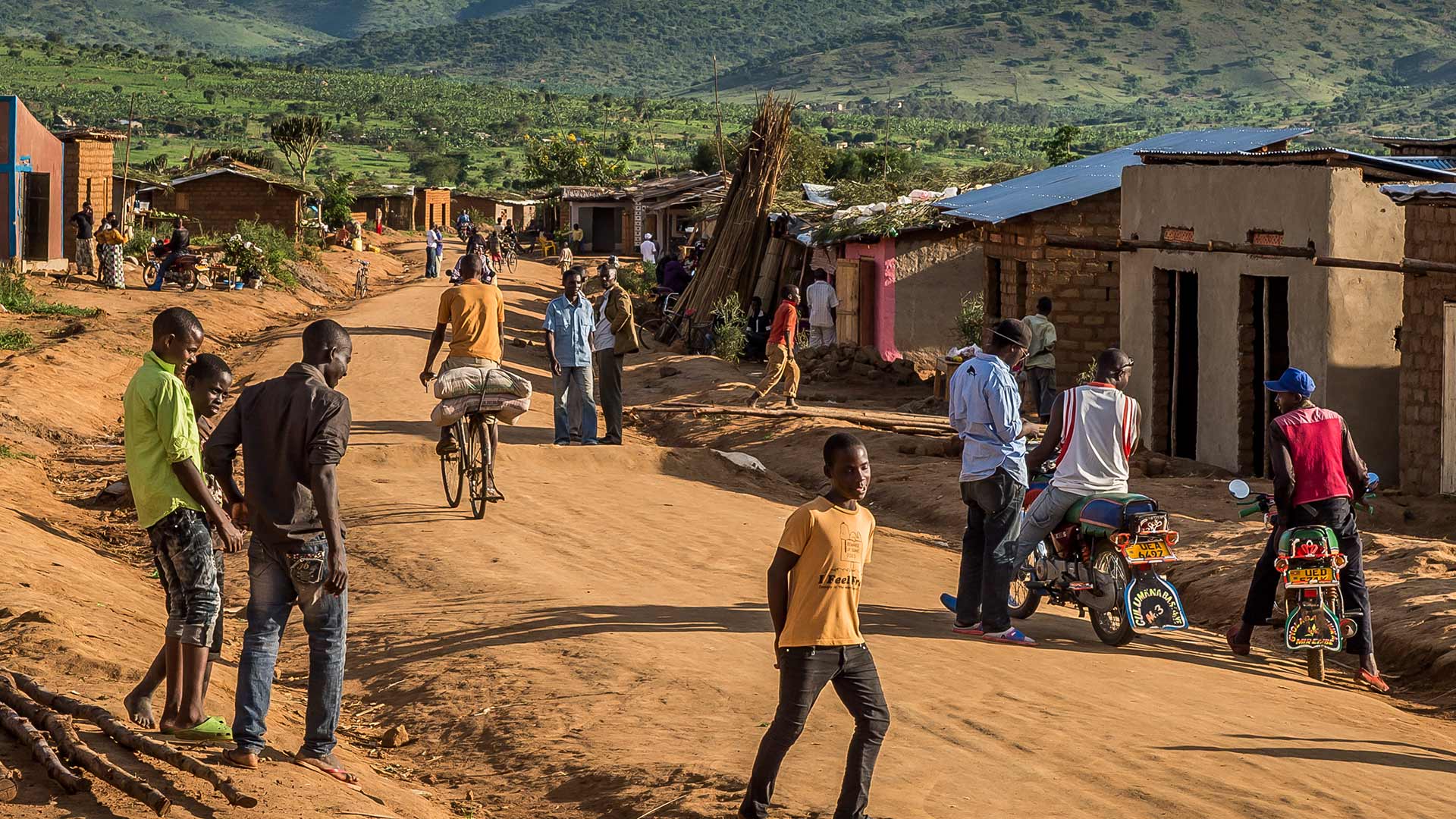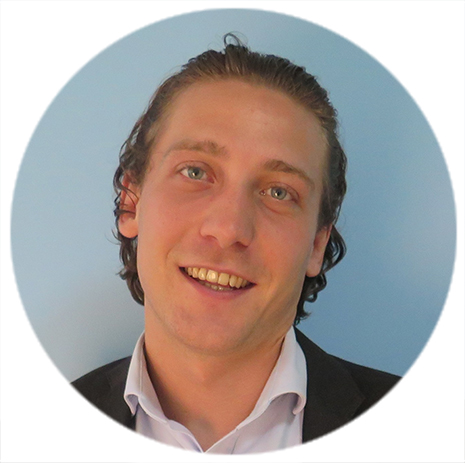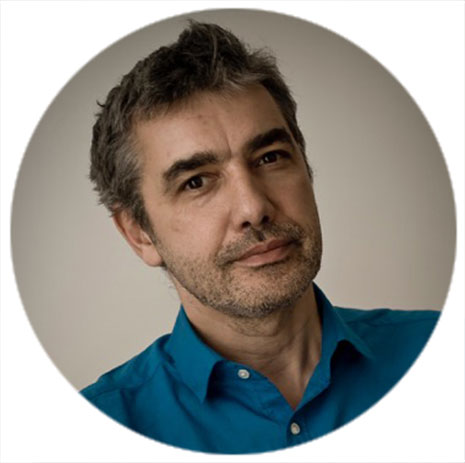 The main street in the settlement nicknamed New Bujumbura.
The main street in the settlement nicknamed New Bujumbura.UNHCR/Frederic Noy
The main street in the settlement nicknamed New Bujumbura.
UNHCR/Frederic Noy
Welcome to New Bujumbura
Unable to bring their capital city with them when they fled Burundi, some refugees are creating a home away from home in Uganda.
Étienne grows sombre as he recalls the night men came to his family home in the Burundian capital, Bujumbura, and kidnapped his parents. They were later murdered.
“When I woke up in the morning, I felt heartbroken. I was even scared to take a bus because people on the streets were attacking those they thought were trying to run away,” he said.
He escaped by picking up a Bible and pretending he was going to church. Now he is among 18,800 Burundian refugees – most from Bujumbura – who fled recent violence to seek safety in neighbouring Uganda.
But while you can take these Burundians out of Bujumbura, their capital remains an enduring part of their identity. Unable to bring the city with them, some have opted to rebuild a version of it themselves in exile. Welcome to New Bujumbura, Uganda.
Comprising schools, a community centre and businesses including factory workshops, a restaurant, a pharmacy and a hairdresser, their namesake community is growing up around the tiny village of Kashojwa in the Nakivale refugee settlement in south-west Uganda.

Étienne fled violence in Burundi and now works in a small factory in Uganda which makes combustible briquettes from agricultural waste. UNHCR/Frederic Noy
“I used to live with some of these people in Bujumbura, so I still have some of my friends around me,” said Étienne, who now works in a small factory making combustible briquettes from agricultural waste as he settles into a new life.
“I like working at the factory because I came with nothing but now I’m able to buy clothes and food. I dream of raising a family, building a house for us and supporting them with a good life,” he says.
Like Étienne, the majority of the 2,500 residents of the mud-brick buildings topped with plastic or tin-sheet roofs have journeyed over 500 kilometres from Bujumbura, some with nothing but the clothes on their backs.

Odette and her sister Nbela run a restaurant in New Bujumbura which offers simple food from Burundi. UNHCR/Frederic Noy
Among those rebuilding their lives in New Bujumbura are Odette and her sister Nbela, who run the local restaurant. It offers simple fare from home, including potatoes, cassava, beans and matoke (a kind of cooked banana mash) served on a makeshift table made from two planks of wood. Occasionally there is fish, but meat remains too expensive to make it onto the menu.
“At least here I am around my fellow Burundians. It makes me feel more at home.”
“I haven’t heard from my father since he was separated from us in Burundi,” says Odette, who finds reassurance in the familiar community the refugees are rebuilding around them. “At least here I am around my fellow Burundians. It makes me feel more at home,” she said.
More than half a million refugees from strife-torn countries including Burundi, Democratic Republic of the Congo and Somalia have sought safety in Uganda. Soon after arrival they are given the right to work, freedom of movement and permission to live in the community rather than in traditional refugee camps.

Pharmacist Larson Manirakiza, 29, advises a customer about a drug at his store in Kashojwa village, Uganda. UNHCR/Frederic Noy
At the end of the main street that runs through New Bujumbura, 29-year-old Larson has set up a local pharmacy. He used to run a dispensary in Bujumbura, and while his new venture is far more basic, his determination to rebuild is typical of the resilience that pervades the community.
“I was a pharmacist before, I’m a pharmacist here,” he says. “The people who were business people before are business people here. Wherever we are, we won’t lose our identity. I like it here – it’s peaceful. Maybe with time we’ll be able to go back, but for now I’m focused on rebuilding my life here.”
“For now I’m focused on rebuilding my life here.”
A local community worker, Benefice Tuyisenge, meanwhile, came to New Bujumbura as an orphan after his parents were killed in Burundi. Once he realized there were other orphans arriving, the 24-year-old took them under his wing and founded the Talented Orphan Refugees’ Association.
“In Kirundi [the Bantu language spoken in Burundi], there is a proverb that says ‘If we work together, we can improve all of our lives,’” says Benefice, who gives twice-weekly English classes at the New Bujumbura Community Centre. There are a wide range of ages, and although many participants had never spoken English before leaving Burundi, all are eager to learn how to express themselves in the official language of their new home.

Benefice Tuyisenge, 24, holds an English class for refugee orphans in a communal tent in the New Bujumbura refugee settlement. UNHCR/Frederic Noy
“I like finding new ways to help people learn,” says Benefice, who also teaches basket and hat making and is a firm believer in the value of song. “I think people learn best when they’re singing, so I try and find out what songs they like. It takes some time [to learn a language] but I know they will get there soon.”
“Our future is good, not only in Uganda, not only in Burundi.”
His optimism is only briefly punctured when the subject of home comes up. While a resident of New Bujumbura, he feels no nostalgia for his former home. “In Burundi there are many problems. I don’t know if I will ever go back there. Right now, there’s nothing I miss from that place. But our future is good, not only in Uganda, not only in Burundi. I want to help people everywhere.”
As night falls, life in the village slows to a halt in the absence of a grid providing electricity. Some students study in their homes by candlelight, while one enterprising refugee has found a way to continue working into the night. Twenty-one-year-old Jeremiah uses electricity generated by solar panels during the day to ensure that his hair salon can continue operating after dusk.
“I heard that Uganda looks after refugees well, so we decided to come here,” says the barber from Burundi, who trims hair by torch light. “My friends were already here too, so I wanted to be with people who I knew I could trust.”

